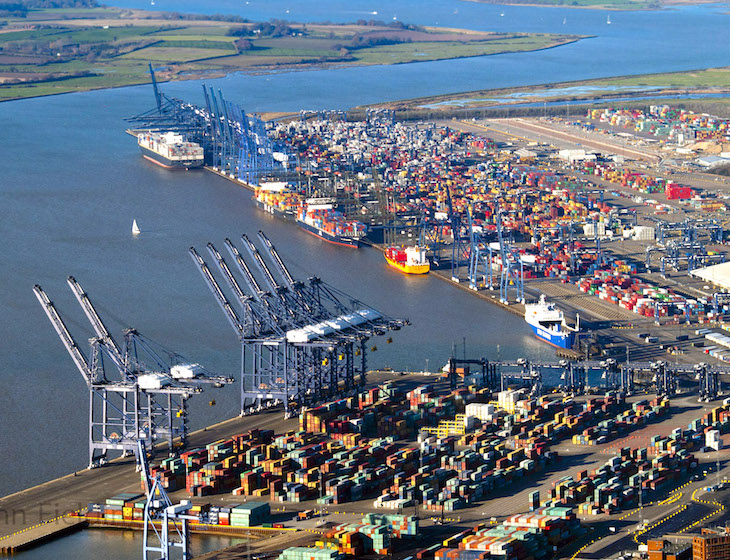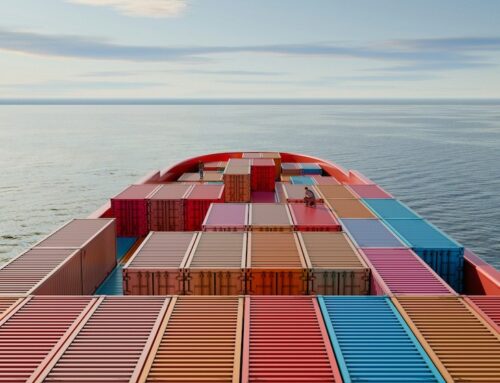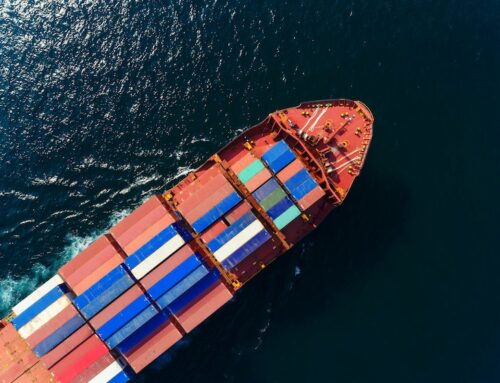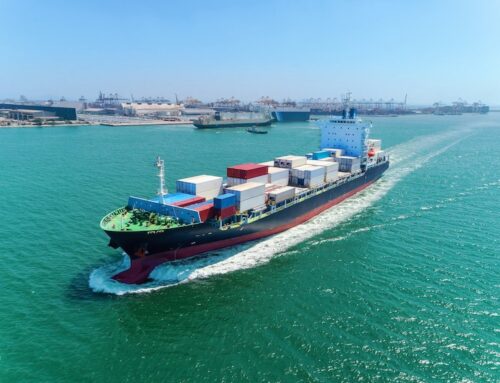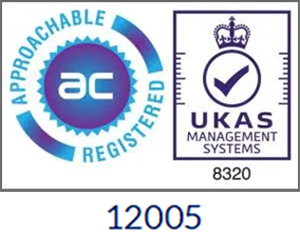Creating a more sustainable future for the shipping industry requires action across every step of the supply chain. We review the Port of Felixstowe’s sustainability initiatives in the UK, with a particular focus on its transition to low-carbon energy sources to which the Green Energy Transition levy is contributing.
Ocean shipping drives 90 per cent of global trade, transporting over 11 billion tonnes of solid and liquid bulk cargo across the world’s seas every year. Nearly all consumer products we purchase, as well as the necessary raw materials for their production, reach UK ports by sea.
The Environmental Impact of Ports
Although ports have a relatively minor role in the climate impacts of the industry and overall supply chains, they do generate negative effects on the environment. These include local pollution of air and water, greenhouse gas (GHG) emissions, noise and air pollution, traffic congestion and widespread sediment contamination.
The contribution to air pollution can greatly affect nearby communities. Sources of emissions include ships docked at the terminal, fuel consumed by cargo-handling machinery, and the different modes of transportation, particularly trucks, that converge at ports to transport goods to their next destination.
What are the Sustainability Targets Affecting Ports?
In June 2019, the UK achieved a significant milestone by enacting legislation that ensures it will no longer contribute to global warming by 2050. This target necessitates achieving net-zero greenhouse gas (GHG) emissions by 2050, replacing the previous goal of at least an 80% reduction from 1990 levels. Additionally, the government launched a comprehensive strategy in 2019 to address air pollution and safeguard public health, as it remains a prominent threat in the UK.
To meet the UK’s Net Zero objectives, the entire shipping industry and its infrastructure, including ports, must transition towards reducing GHG emissions resulting from port-related activities. Major ports are now obligated to report their air quality emissions to the UK Government every three years. In order to meet the UK’s net zero emissions targets, shipping and its infrastructure must transition to low carbon energy sources.
The Adoption of Sustainability Initiatives by UK Ports
The adoption of sustainable practices within port operations is experiencing significant growth in the UK. Ports throughout the country are embracing the potential of onsite renewable energy to achieve low-to zero-carbon energy for their own operations. This, coupled with an increasing emphasis on ‘smart’ energy management, indicates a future where ports themselves become zero energy hubs, facilitating resource-efficient and zero-emission solutions.
Port operators are prioritising investments in electric and hybrid equipment, as well as state-of-the-art propulsion technologies in cases where electrification is not yet feasible, to reduce their direct emissions. The introduction of new equipment, coupled with innovative approaches to collaboration with supply chain partners, is proving to be effective in reducing emissions and improving air quality.
What is the Port of Felixstowe Doing to Improve its Environmental Performance?
As part of the port’s strategy to support carbon reduction, the Port of Felixstowe, is undergoing a three-year decarbonisation project. Substantial investments have been made to replace diesel-powered equipment with electric and battery-powered solutions. Additionally, the port has plans to adopt green hydrogen, a sustainable method of hydrogen production. The utilisation of green hydrogen holds the potential to decarbonise the UK’s transport sector by transitioning to fuel sources that are less harmful to the environment compared to pure hydrogen or fossil fuels alone.
Adoption of Green Hydrogen
Last year, it was announced that in a £150 million project, ScottishPower is building a green hydrogen plant at the Port of Felixstowe, which is projected to bring in 100 megawatts of power by 2026. ScottishPower will supply hydrogen to the vehicles and machinery used by the Port of Felixstowe, which is used by thousands of heavy goods vehicles each year.
Electrification Upgrade
The coming years will see the upgrade of the existing 11,000-volt electricity network to supply the seventeen new electric gantry cranes used to load and unload containers. The electrification upgrade will also allow 48 new electric tractor units for the port to replace some of the existing diesel vehicles which transport containers around the port for distribution.
Electric Cargo Handling Equipment
The port has placed orders for 48 battery-powered terminal tractors and 17 zero-emission Remote controlled Electric Rubber-Tyred Gantry cranes (ReARTGs) to replace existing diesel-powered cargo handling equipment. Together with the electrical power upgrade into the port which is anticipated to deliver a 20% reduction in CO2 over the next 3 years.
Green Energy Transition Levy
The Port of Felixstowe has stated that to complete its decarbonisation journey, they expect incremental costs to approach £200m involving both electric and hydrogen solutions to achieve its net-zero goals.
It is due to these additional overheads that the Port of Felixstowe introduced the Green Energy Transition tariff effective from 1st January 2022 to contribute to its decarbonisation programme.
The port is committed to providing visibility on progress and therefore its report of air quality emission levels plus an assessment that is independently audited can be found on its website. The last report carried out in 2019 can be found on the Port of Felixstowe’s website and will be updated with the 2022 report when it becomes available.

